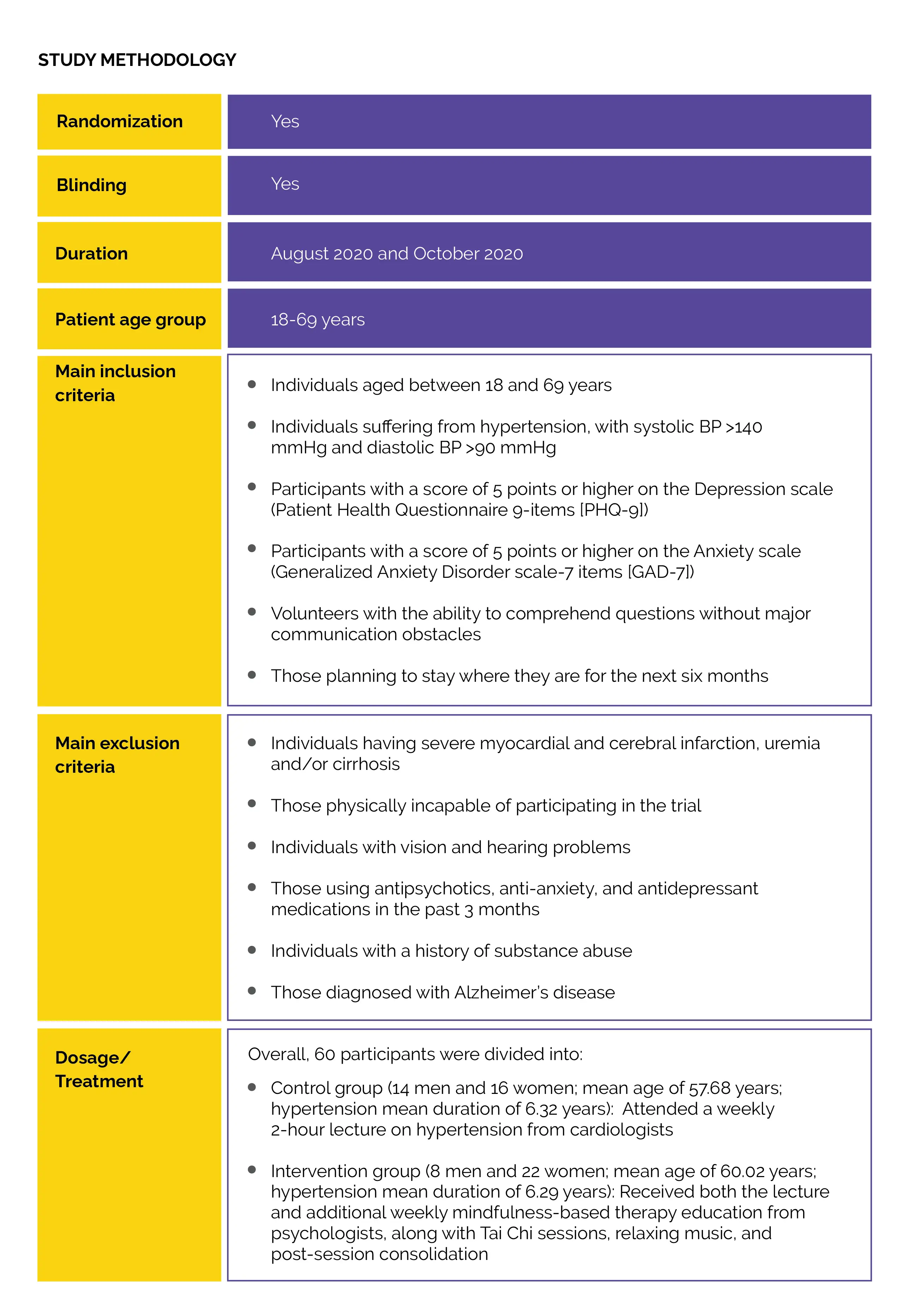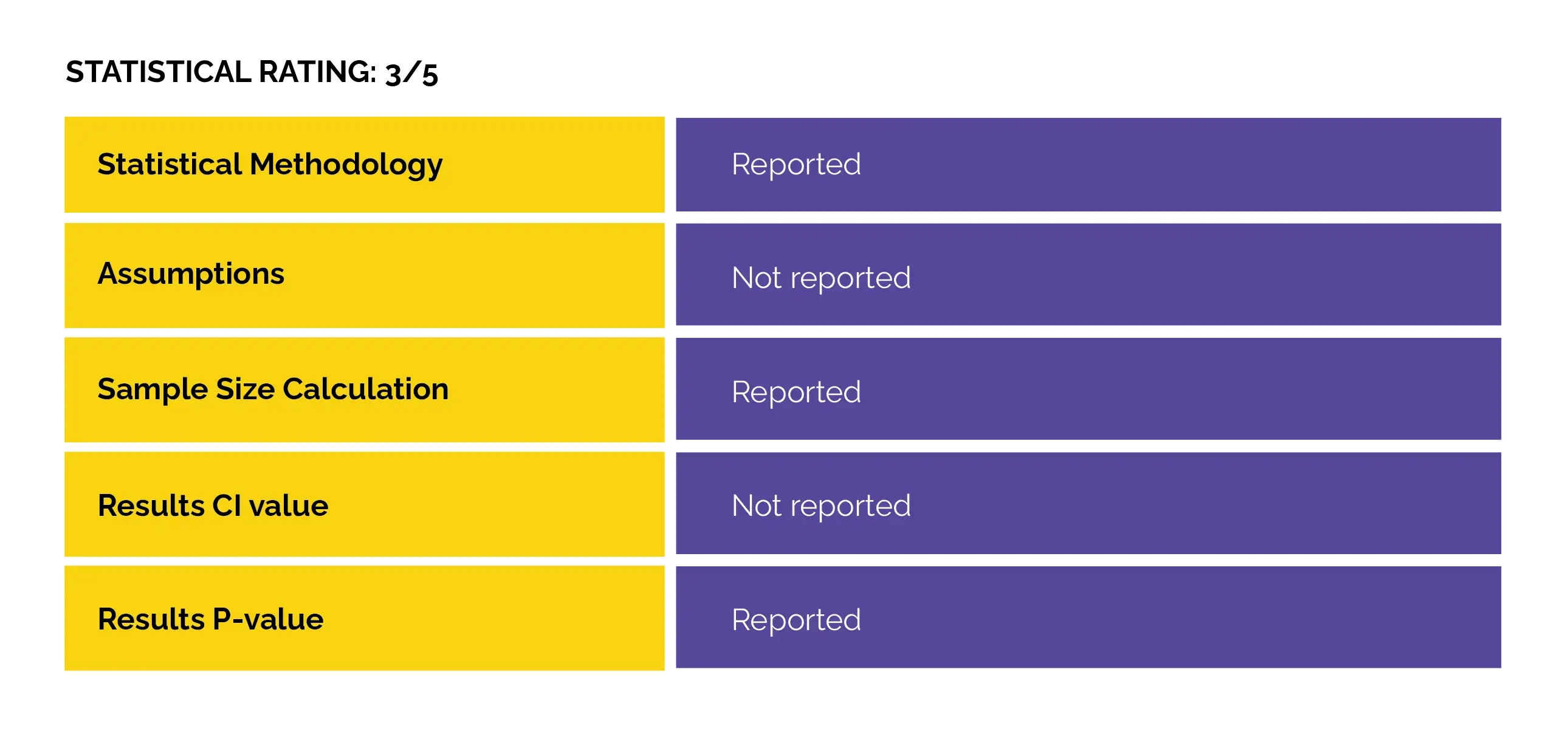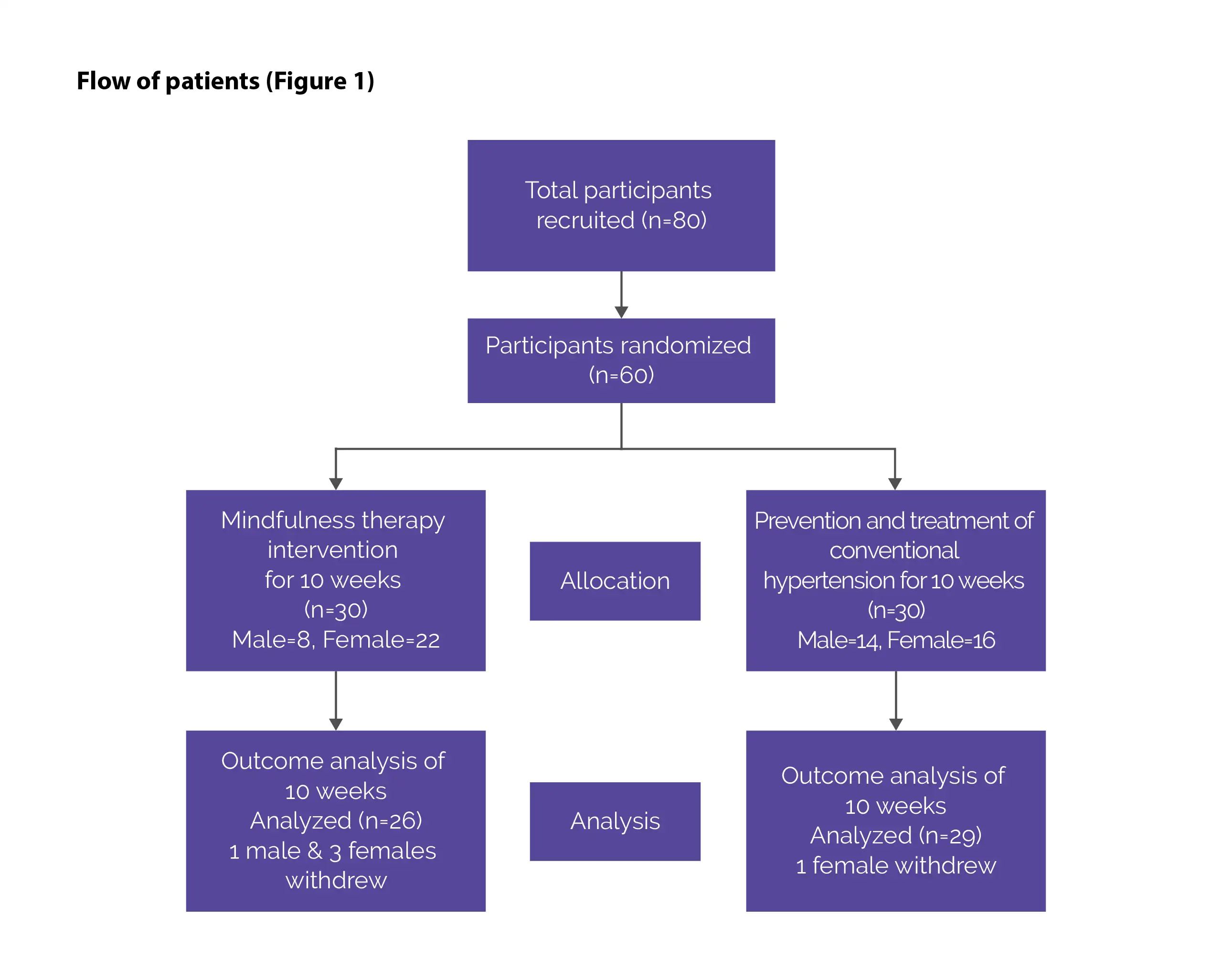Categories
Change Password!
Reset Password!


Hypertension, a prevalent chronic disease affecting a significant proportion of adults, typically demands lifelong control of blood pressure (BP) through medications.
Short-term mindfulness-based interventions offer moderate improvement in depression and/or anxiety symptoms while proving effective in reducing blood pressure and enhancing self-efficacy ratings.
Hypertension, a prevalent chronic disease affecting a significant proportion of adults, typically demands lifelong control of blood pressure (BP) through medications. Many hypertensive individuals also grapple with concurrent depression and/or anxiety. Furthermore, a high proportion of these patients fail to adhere to medical advices. This elicits severe complexities and also diminishes the patients' quality of life. Hence, addressing depression and/or anxiety holds equal significance to hypertension management. A strong correlation has been observed between hypertension and depression or anxiety, both of which act as independent risk factors for hypertension.
Stress reduction has emerged as an optimal strategy in the continuous management of high BP. Psychotherapy tailored for hypertensive individuals with depression and/or anxiety yields improvements in both psychological well-being and BP levels. Research on psychotherapy often centers on hypertensive patients in hospital settings with severe depression and/or anxiety. Only a few studies examine the management of these hypertensive individuals with depression and/or anxiety within the community. Despite limited studies, it is acknowledged that, apart from exceptionally severe instances, many hypertension-affected patients in China who also suffer from depression and/or anxiety receive treatment at the community level.
Typically, hypertensive patients are managed with a combination of medications to regulate BP; nonetheless, outcomes may prove unsatisfactory, partly due to non-compliance with medical recommendations. Since 1985, mindfulness has been utilized for self-regulating chronic pain and has demonstrated both short- and long-term enhancements. According to the findings of a study, mindfulness-based cognitive treatment and mindfulness-based stress reduction combine Western cognitive-behavioral techniques with Eastern mindfulness practices. These therapies encompass three main components: non-judgmental observation, heightened awareness, and present-moment focus.
By attending to the present, individuals can successfully handle their cognitive, physiological, and behavioral responses. Regular engagement in mindfulness practices facilitates modifications wherein individuals become attuned not only to their daily activities but also to the automatic functions of their minds regarding past and future events. Notably, functional training, which shares similarities with mindfulness, also exhibits the capacity to diminish anxiety levels and foster improvements in unhealthy lifestyle habits. The conventional approach to mindfulness-based therapy for people having high BP typically involves a group-based program, comprising regular group sessions and individual practice sessions aimed at aligning behaviors, feelings, thoughts, and emotions.
Over the past decade, global health initiatives have emerged to enhance the well-being of individuals worldwide, encompassing mental health concerns. For instance, mindfulness-based therapy has gained recognition as a standardized therapeutic option with notable outcomes, presenting a potential non-pharmacological alternative for hypertension supervision within communities. This therapeutic approach equips patients experiencing hypertension along with depression and/or anxiety with a mechanism to address negative emotions and physical symptoms through a calming method, potentially boosting their resilience to stressors or reducing their reactivity.
RATIONALE BEHIND RESEARCH
Only a limited number of reports address the treatment of hypertensive patients suffering from depression and/or anxiety in the community. Hence, this study was conducted.
OBJECTIVE
A prospective, double-blind, randomized controlled trial was performed to examine the efficacy of mindfulness-oriented intervention in reducing psychological stress and hypertension among hypertensive patients diagnosed with depression and/or anxiety.


Study outcomes

Study Outcomes
In this RCT, the impact of a 10-week mindfulness-oriented intervention on controlling BP and improving negative emotions in hypertensive patients was assessed. The primary, as well as secondary outcome indicators, were analyzed strictly in accordance with the experimental scheme and protocol. As found, mindfulness-based therapy adequately reduced depression. The betterment in systolic BP can be due to the relaxation of an overactive sympathetic nervous system resulting from chronic stress. Initially, anxiety levels dropped slightly, but this decrease became meaningful by the conclusion of the 10-week intervention.
These results imply that mindfulness-based therapy is beneficial for both anxiety and depression, with a particular emphasis on alleviating depression. It's vital to note that anxiety and/or sadness frequently coexist with hypertension. To minimize or prevent the progression of the condition, the data also indicated a proactive approach to mindfulness-based therapy, especially in the early phases. Anxiety, despair, and BP swings can all be less common when BP is effectively managed. Additionally, incorporating exercise therapy within mindfulness programs can lower BP by encouraging participants to adopt healthy lifestyle habits.
Interventions targeting depression and/or anxiety are valuable auxiliaries in managing hypertensive patients with these conditions. Compared to the conventional approach, mindfulness-driven treatment dramatically reduced systolic BP, lowered anxiety and depression. These findings aligned with the previous studies indicating that mindfulness-based therapy can lessen hypertension or stress levels in hospitalized patients. However, there was no discernible change in diastolic BP. Stress and generalized anxiety disorder (GAD) are not always the same or directly related, but there are connections between them, with chronic stress potentially contributing to GAD relapse.
Although stress was not the focus of the study, this insight helped to explain the current findings, which indicate that mindfulness training seems to be beneficial in relieving hypertension as well as decreasing levels of anxiety and despair. Also, the mindfulness-centered approach is superior to basic health education in aiding hypertension individuals manage their systolic BP and psychological stress. Systolic BP is known to be strongly correlated with psychological and physical state, especially in immediate responses. In such scenarios, mindfulness-oriented intervention may help calm the minds of people with high stress levels and regulate sympathetic signaling through noradrenaline.
Strandberg and Pitkala's findings, which illustrated improved outcomes after intervention for hypertension patients with decreased depression, lend credence to this theory. Even with potent medication, diastolic BP—which represents the elasticity of arteries—is difficult to change quickly or easily. While mindfulness-based therapy may not profoundly affect diastolic BP, it depicted an improving trend when compared to the educational intervention alone. Subjects in the mindfulness-based group had remarkably higher self-efficacy and better mental health compared to the control group after the intervention.
Negative psychological emotions from hypertension and poor mental state can worsen mental stress and treatment compliance, creating a harmful cycle. Mindfulness-based therapeutic approach helps patients tackle emotions via meditation, improving attention and mental health over time by enhancing mindfulness and breaking the negative cycle. The awareness rate, which reflects understanding or opinion on health issues, substantially differed between the intervention and control groups, highlighting the effectiveness of the intervention for managing patients dealing with comorbid hypertension and anxiety.
The findings aligned with other studies showing that mindfulness interventions can competently control hypertension and minimize anxiety and depression. After the combined mindfulness therapy and health education, participants in the intervention group had a significantly increased awareness of their physical and mental health, leading to better management of BP and overall health improvements.
Despite a relatively low number of patients not completing the follow-up, the intent-to-treat analysis maintained the trial's statistical power. The results indicate that mindfulness therapy exhibits a beneficial effect.
One volunteer in the intervention group with mild depression reported major improvements in depression scores and mental health, even without completing all sessions. In the control group, two volunteers who completed all health education sessions also experienced vital improvements. These findings suggest that both mindfulness therapy and health education can boost mental health in patients having hypertension and depression/anxiety, though further research is needed due to some patients not showing remarkable progress.
Hypertensive people with depression and anxiety face pivotal impacts on their personal lives and incur high medical and social costs. Mindfulness therapy not only reduces these financial costs but also curtails adverse effects from medical interventions. Moreover, advancements in network development have markedly boosted the convenience of group psychotherapy, especially in the context of mindful therapy. For those with unsatisfactory responses to drug treatments, combining mindfulness-based cognitive therapy can serve as a useful model to ease depression and anxiety symptoms in hypertensive individuals.
In patients with hypertension, a10-week mindfulness-based intervention effectively mitigates symptoms of mood disorders. It also leads to a significant decrease in systolic BP, and improvements in self-efficacy and overall awareness of physical and mental health. Hence, mindfulness-centered approach can be a valuable supportive strategy for tackling hypertension in individuals with coexisting depression and/or anxiety.
Trials
Mindfulness-based intervention for hypertension patients with depression and/or anxiety in the community: a randomized controlled trial
Hailiang Zhang et al.
Comments (0)